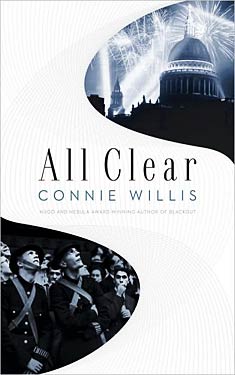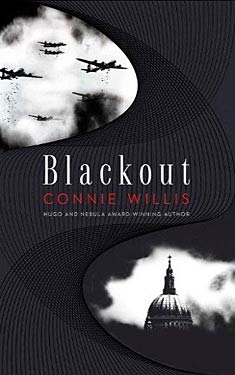Connie Willis
Completed 1/27/2014, Reviewed 1/28/2014
5 stars
Connie Willis’ two books, “Blackout” and “All Clear”, are
actually one novel, published in two volumes. Willis won the Hugo for both books, not as a
tie, but as a single novel. So I am
reviewing the two volumes in one review.
These books bowled me over! I
think this is the best >1000 page novel I’ve ever read, except for LOTR. I was dreading reading this because of the
cumulative size. But after zooming
through the first volume, I couldn’t wait to dive into second. “Blackout/All Clear” did for me with WWII that
“The Doomsday Book” did with the calamity of the black plague. Willis’ attention to the details of daily life
in desperate times created another experience that again left me near tears.
 This story is another chapter in the adventures of the
historians at
This story is another chapter in the adventures of the
historians at
This book may be the most suspenseful book I’ve ever read. Willis creates a tremendous amount of tension
by weaving together the story lines of each of the historians in WWII. The lines are not only by location, but also
by time. The action takes place in
1940-1941, 1944, 1945, 1995, and 2060. Through
most of the book, you try to piece together how all these time and story lines
are related. Almost every chapter ends
in a revelation or a cliffhanger, almost always leaving me gasping, “OH NO!” or “OMG!”
As the different pieces came together, I was breathless.
Willis does not write a lot of prose. Her character and plot development comes
mostly from her characters conversations and thoughts. Willis is masterful at this. I developed deep feelings for each of the main
characters. I think I most loved Eileen,
who continually seems to be derailed by circumstance and her sense of duty.
I grew terribly fond of the supporting characters as well. They provide a lot of light humor in the midst
of the tragedy that has befallen the main characters. My favorite supporting character was Sir
Godfrey, an aging Shakespearean actor who begrudgingly helps put on free plays
for the public with his acquaintances from the bomb shelter they shared. He’s witty, charming, and of course, always
has a theatrical quote for every situation. Of course the other supporting characters are
terribly British, and as we’ve come to expect in many comedies of manners, they
always seem to be a little oblivious, focused more on odd details rather than
the important issue at hand. It’s not
nearly as funny as "To Say Nothing of the Dog", but it helps break up the
tension of the main story lines.
Mostly, the supporting characters and their situations help
you understand life in London
during the Blitz. By reading this book, I
felt that I got to experience life in Britain during the war, and the
valor and spirit of the British people. Willis did a lot of research in writing this
novel, and many of the stories come from her interviews with people who
survived these times. That becomes
really evident in the day to day interactions between the historians and the “contemps”.
It provides a great understanding of the
concept of ordinary people doing extraordinary things in extraordinary times.
As much as I want to gush about this book, I do have to
admit there are some flaws. There was
one story line that didn’t grab me as much as all the others. That was of an historian working on a
disinformation team. The team was anonymous,
working with code names from Wilde’s “The Importance of Being Earnest.” It was a cute concept, but much of the patter
between the characters was a bit dry. It
picked up when they had specific missions, but it’s probably the only place in
the two books where I found myself fading out. However, it was worth getting through those
chapters, because how they came together with the other plot lines amazed me.
Another flaw was that the main character Polly spent a lot
of time thinking the same thoughts over and over again. She was continually stressing about how she
needed to hide her revelations of the historians’ plights from them and how
they might have altered the outcome of the war as well as the lives of the
contemps with whom they interacted. At
times, it got a bit tiring. It felt like
hashing and rehashing. Nonetheless, I
loved Polly is a beautifully drawn character, and I loved her almost as much as
Eileen.
While I felt the need to mention these flaws, they are a
minor annoyance when compared to the experience of the novel as a whole. It’s incredibly fast-paced with intertwining
plots, wonderful characters, and heart-wrenching twists. When I read a book I want to have an
experience. I don’t have to cry over
every book, but I love when I am emotionally moved as profoundly as I was with
this. Between “Blackout/All Clear” and
the “The Doomsday Book,” Connie Willis has provided me with two of the most
moving experiences I’ve had in SF. Like “The
Doomsday Book,” I give “Blackout/All Clear” five stars. (Note: although I’ve read and reviewed “The
Doomsday Book” and "To Say Nothing of the Dog", I haven’t posted them yet. They will be coming soon!)

No comments:
Post a Comment